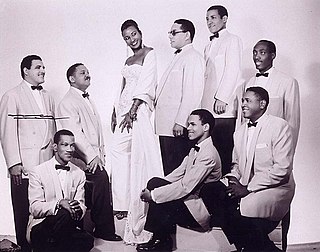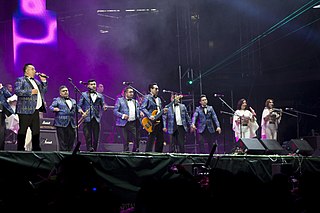
La Sonora Matancera is a Cuban band that played Latin American urban popular dance music. Founded in 1924 and led for more than five decades by guitarist, vocalist, composer, and producer Rogelio Martínez, musicologists consider it an icon of this type of music. Notable singers to have sung and recorded with the band include Bienvenido Granda, Daniel Santos, Myrta Silva, Miguelito Valdés, Leo Marini, Celia Cruz, Nelson Pinedo, Vicentico Valdés, Estanislao "Laíto" Sureda, Alberto Beltrán, Carlos Argentino, and Celio González.

Grupo Niche is a salsa group founded in 1978 in Cali, Colombia. It enjoyed great popularity throughout Latin America. It was founded by Jairo Varela and Alexis Lozano. Varela remained with the group throughout his life, serving as producer, director, songwriter, vocalist, and guiro player. Alexis Lozano, trombone player and arranger later left to form Orquesta Guayacán. The group also included Nicolas Cristancho "Macabi" on the piano, Francisco Garcia "Porky" on the bass, Luis Pacheco, on the congas, and vocalists Jorge Bazán and Hector Viveros.
Los Angeles de Charly is a Mexican cumbia group led by vocalist Carlos Becies. The group was formed in 1999, after Charly Becies and fellow vocalists Guillermo "Memo" Palafox and Jonathan Martínez left the popular group Los Ángeles Azules and became one of leading exporters of the romantic Mexican cumbia genre. In 2000, the group's ten-track album Un Sueño peaked at No. 29 on the Billboard Independent Albums chart. Their follow-up album Te Voy a Enamorar was released in 2001 and went on to be number one on the Billboard Top Latin Albums chart.

Grupo Bryndis is a Mexican grupero band from Cerritos, San Luis Potosí, - though founded in Santa Paula, California, in 1983 by Mauro Posadas, the band is a Latin Grammy Award winner. The band has performed ballads, cumbias, rancheras, and huapangos.

Leopoldo Dante Tévez was an Argentine composer and singer. He recorded more than 20 albums during his long career during the late 20th century between Argentina and Mexico.

Benjamín "Chamín" Correa was a Mexican guitarist. He was renowned in the Spanish-speaking world for his traditional romantic music. Member of Los Tres Caballeros together with Roberto Cantoral and Leonel Gálvez from 1954. In 1957 they gained 4 golden discs for being the trio of major success on a global scale. He died in Cuernavaca, Morelos at the age of 90.

The 7th Annual Latin Grammy Awards were held for the first time in New York City, NY. The awards show was held at Madison Square Garden on Thursday, November 2, 2006. Shakira was the big winner winning Album of the Year, one of four awards that she won. She is the first female artist to win Record of the Year, Album of the Year, and Song of the Year.

Luis Rafael Valdez Vargas is a Dominican musician and singer. He became involved in popular music after meeting a local musician who taught him how to play guitar.

Grupera is a subgenre of regional Mexican music. It reached the height of its popularity in the 1990s, especially in rural areas. Grupera music traces its roots to the rock groups of the 1960s yet has evolved significantly over time. Typically performed by ensembles of four or more musicians, the genre prominently features electric guitars, Musical keyboards, and drums. The popularity of grupera music surged notably during the 1980s, propelling it into commercial viability and establishing its place within the Latin music landscape. Today, the genre is widely acknowledged and celebrated in prestigious Latin music awards ceremonies such as Lo Nuestro Awards and the Latin Grammy Awards, reflecting its enduring influence and cultural significance across Latin America and beyond. Grupera music is a distinct Mexican musical genre that blends traditional ranchera melodies with influences from norteño and other regional styles like corridos, cumbias, charangas, ballads, boleros and huapangos.

Los Caminantes are a Mexican grupera band from San Francisco del Rincón, Guanajuato. Originally called Los Caminantes Aztecas, the band was formed in San Bernardino County, California, by brothers Agustín, Brígido, Horacio and Bernardo Ramírez in 1976. In 1982, Martín Ramírez, the youngest brother of the band, joined the group replacing Bernardo on keyboards. They later acquired Humberto Navarro as their drummer.
Top 100 México was a record chart which accounted for sixty percent of the albums sold in Mexico. The chart had the support of major record distributors in Mexico and was issued by the Asociación Mexicana de Productores de Fonogramas y Videogramas on a weekly basis from 2005 until July 9, 2020, when the chart was discontinued. The Top 100 México contained over 100 titles sold in the country, with separate charts that include 20 albums for popular music genres, such as norteño, banda and ranchera, Spanish, and English language albums.
Los Invasores de Nuevo León are a Mexican norteño set founded in 1977. The first members of the group was Eduardo "Lalo" Mora, Isidro "Chilo" Rodríguez, Luis González and Mario Avena.

Lisandro Meza Márquez was a Colombian singer and accordionist. After he started playing the accordion in 1959, Lisandro was described as the "King of Cumbia," "El Macho de América" and the "Master of Vallenato Sabanero." Meza was once part of the group, Los Corraleros de Majagual in 1962, which was a successful band in both Colombia and Venezuela.
Grupo Yndio is a Mexican band from Hermosillo, Sonora founded in 1972, by some of the members of the dissolute band Los Pulpos.
Sonora Palacios is one of Chile's oldest tropical orchestras. Formed in the early 1960s, the group is one of the main exponents of Chilean cumbia and were pioneers of the style. They were the first Chilean band to record cumbia and are widely recognized for establishing the popularity of cumbia in Chile.
Los Guardianes del Amor were a Mexican band formed in 1992. They were the grupero act with the most nominations for Latin Grammy Award for Best Grupero Album with five, but have never won the award. The band's five original members are Arturo Rodríguez, Óscar Saúl Cervantes, Daniel Poplawsky, Pablo Calderón and Ernesto García.

Los Ángeles Azules are a Mexican musical group that plays the cumbia sonidera genre, which is a cumbia subgenre using the accordion and synthesizers. This results in a fusion of the sounds of cumbia from the 1950-1970s with those of 1990s-style electronic music.

Calibre 50 is a regional Mexican band. Formed in Mazatlán, Sinaloa, in 2010 by Edén Muñoz, the band has had several lineup changes, with the current roster consisting of lead vocalist Beto Gastélum, backing vocalist & twelve-string guitarist Tony Elizondo, diatonic accordionist Martín "Trompudo" López, sousaphonist Alejandro Gaxiola, and drummer Erick García.
Marco Tulio Aicardi Rivera, better known by the name Rodolfo, was a Colombian singer of tropical music who was active from the 1960s until his death. He is most famous for his song "La Colegiala" credited to Rodolfo y su Tipica RA7.

Ritmo! is a cumbia album from the Colombian musical group Sonora Dinamita. It was released on the Discos Fuentes label.












